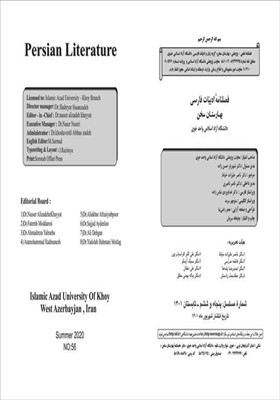Studying and Analyzing " The Aynolhaghigha " from Mohammad Mir Zivaroddin Padeshah Saheb
Subject Areas : Abstract ArticlesGhobad Mehrpour 1 , Ahmad Reza Yalameha 2 , Maryam Mahmudi 3
1 - Ph, D. student in Persian language and literature, Dahaghan branch, Islamic Azad University, Dahaghan, Iran.
2 - Professor in Persian language and literature department, Dahaghan branch, Islamic Azad University, Dahaghan, Iran
3 - Associate professor in Persian language and literature , Dahaghan branch, Islamic Azad University, Dahaghan, Iran.
Keywords: mysticism, manuscript, Mir Ziveroddin, The Aynolhaghigha,
Abstract :
The present paper deals with the studying of the Aynolhaghigha manuscript from Mohammad Mir Zivaroddin Padeshah Saheb (died in 1151) who was Afghani mystic and poet in Farsi language. The unique manuscript of the book is kept with code number of 5610 at the central library of Tehran university. The present research which has been done in descriptive-analytic method is to answer the question: What is the theme and the main topic and content of the Aynolhaghigha? The findings of the study indicate that this book is didactic and mystical which has been written in ethics and theoretical and practical mysticism. Its topic is in mystical positions, stages, perilous situations, the condition of devotee and the wayfarer, and the maxims of the mystics specially the Oveysiyeh sect. This book presents the thoughts and the speculations of the author which is in poetry and prose. And its prose section is consisting of mystical texts and lacks of complexity. Mir Zivaroddin always uses simple and short sentences because his aim is to make his disciples grasp the main points. Of the major privileges of the Aynolhaghigha is having a comprehensive information about the Oveysiyeh sect and Nagshbandiyeh sects and their religious leaders which can be used as a reference mystical book.
الف: کتابنامه
12- مایل هروی، نجیب، (1369)، نقد و تصحیح متون (مراحل نسخهشناسی و شیوههای تصحیح نسخههای خطّی فارسی) مشهد: آستان قدس رضوی، بنیاد پژوهشهای اسلامی.
13- محمّدمنیر عالم، (1376)، تذکره مشایخ اویسیه، اسلام آباد: مرکز تحقیقات فارسی ایران و پاکستان.
14- محمّود کاشانی، عزالدّین، (1374)، مصباح الهدایه و مفتاح الکفایه، تصحیح جلالالدّین همایی، تهران: سخن.
15- مدرّسی چهاردهی، نورالدّین، (1361)، سیری در تصوّف و شرح حال مشایخ و اقطاب، تهران: اشراقی.
16- میبدی، رشیدالدّین ابوالفضل، (1339)، کشف الاسرار و عدةالابرار، تهران: چاپخانه سپهر، چاپ دوم.
17- میرزیورالدّین، محمّدپادشاه صاحب، (1151ه.ق)، عین الحقیقة، نسخه خطّی به شماره 5610، تهران: دانشگاه تهران.
18- مولوی، جلالظالدّین، (1379)، مثنوی مولوی ، به تصحیح رینولدالین نیکلسون، تهران: امیرکبیر، چاپ چهارم.
ب- مقالات
19- عبّاسی، بابک، (1385)، «آموزه حقیقت افلاطون و هایدگر: بحثی انتقادی»، نامة مفید، شمارة ۵۳ اردیبهشت، صص: 25- 40.
20- مسگرنژاد، جلیل، (1367)، «تصحیح مثنوی کنز الرموز»، فصل نامه معارف، دورۀ پنجم، شمارۀ اوّل، فروردین و تیر، صص: 154- 155.
21- ملکی، فاطمه و همکاران، (1399)، «معرّفی و بررسی نسخة خطّی مثنوی «شاهد غیبی» ماهنامة تخصّصی سبک شناسی نظم و نثر فارسی (بهار ادب) علمی4، سال سیزدهم، شماره هفتم، شمارة پیاپی 53، صص: 135-58.
22- موسوی نسب، سیّدمحمّدرضا، (1393)، «اهداف، اصول و روش های تربیت عرفانی»، اسلام و پژوهشهای تربیتی، سال 6، شمارة2، پیاپی 12، صص: 36-19.
_||_

